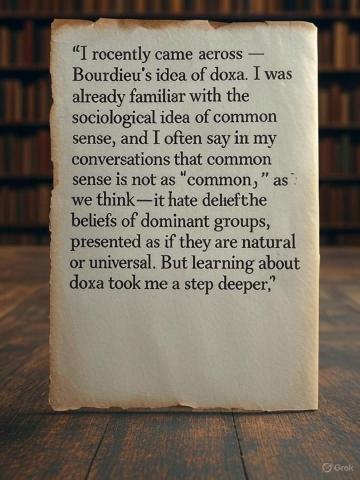
Invisible Beliefs, Visible Reflections
“मुझे हिंदी बहुत अच्छी तरह आती है। मैं हिंदी में सब कुछ पढ़ सकती हूँ। लेकिन वह कौन है जिसने इंग्लिश में पढ़ाने के लिए कहा है? मैं इंग्लिश नहीं पढ़ पाती हूँ, और अब तो सब कुछ इंग्लिश में ही है। मुझे उस व्यक्ति पर बहुत गुस्सा आ रहा है जिसने हमें इंग्लिश पढ़ने के लिए कहा।” — this is what Savita, a class 8 student, wrote in her reflective diary on 18th January, 2020. In my classroom, writing a one-page reflection is not just a task — it is a fundamental principle and an essential part of the pedagogy I follow.
I am not trying to get into a debate about whether English is good or bad. I am sharing this reflection because it beautifully connects to a powerful sociological concept I recently came across — Bourdieu’s idea of doxa. I was already familiar with the sociological idea of common sense, and I often say in my conversations that common sense is not as "common" as we think — it often reflects the beliefs of dominant groups, presented as if they are natural or universal. But learning about doxa took me a step deeper.
Common sense is what people generally believe based on everyday experience — like “fire is hot” or “you should respect elders.” These are practical ideas that help us in daily life, and people can still discuss or question them. But doxa goes deeper. It includes the beliefs and rules we follow without even realizing it. We don’t question them, we don’t talk about them, and we begin to treat them as natural or just the way things are. For example, saying “if you don’t study, you’ll fail” is common sense — we can agree or disagree. But saying “boys are better at math” is doxa — many people accept it without ever questioning why, even though it is unfair and untrue.
So while common sense is shared practical knowledge that can still be debated, doxa refers to those deep, invisible beliefs that feel unquestionable and often hide inequality. The word doxa comes from the Greek language, where it simply meant opinion or belief — what people generally think. But Bourdieu gives it a deeper sociological meaning: doxa refers to those hidden, silent beliefs and values in society that we absorb as “normal” — even when they’re not fair.
When I came to understand this idea, I was struck by how deeply schools are involved in creating and maintaining doxa. Schools reward certain behaviours — like neat handwriting, quiet obedience, and speaking in English — and students begin to think these are the “right” ways to be. Those who don’t fit this pattern, maybe because of their background or language, may begin to feel they are less capable, even if they have other strengths. Schools also often don’t explain the reasons behind rules — like why uniforms are compulsory or why only some languages are used in class. When rules go unquestioned, they become invisible truths — doxa. And schools usually reflect the values of dominant groups as if those values belong to everyone. Children from marginalized backgrounds may then feel like outsiders, not because they lack ability, but because the school doesn’t recognise or respect their identity.
So, what’s the real issue with doxa? The problem is that it hides inequality by making it look natural. It stops us from imagining anything different, because we don’t even realise something is wrong. In short, doxa makes us blind to unfair systems because we’ve been taught to see them as normal. And that, perhaps, is the answer to a fundamental question: Why, even after almost 150 years of modern schooling, has society not changed in more meaningful ways? Why do inequalities in roles, power, and access remain so stubborn? It’s because of doxa, working silently below the surface.
Unless we make these invisible beliefs visible — unless we bring them into conversation, into reflection, into questioning — education will not fulfill its real purpose: creating a just and equitable society. I now realise, perhaps quite late, that my pedagogic practice of daily reflective writing helps children begin to question these doxa. As we saw in Savita’s note, when reflection becomes a regular habit, it slowly begins to unearth the invisible — and that is where real education begins.
- Log in to post comments
